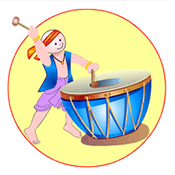
Dimdima
Online Children's Magazine from India

Dimdima
Online Children's Magazine from India
By Rani Iyer

The first time I heard about silent spring, I thought it was a poem. Passages from the book were read by one of my teachers, and the lyrical quality of the prose kept the class spellbound. Rachel Carson was a scientist, writer, educator, conservationist, and a nature lover. She wore many hats. Born on May 27, 1907 in Springdale, Pennsylvania, she was one of the three children.
Rachel chose a career in science, a field that was not open to women at that time. She was hardworking, and often spent hours in the library and seashore to learn more about things that fascinated her. When she could not afford to pay her tuition fees for college, she tried supporting herself by writing for magazines on nature and doing odd jobs.
When that did not help, she gave up her property to the college in order to cover for the fees.
After she graduated from college, she began to work in the U.S. Bureau of Fisheries to write radio scripts and pamphlets for the public. From this position she rose to become the Editor-in-chief for the U.S. Fish and Wildlife Service, a distinction achieved by few women. To supplement her income, she continued to write to magazines that eventually led to the publication of her first book. In her lifetime she wrote four books: Under the sea wind (1941), The sea around us (1952), The edge of the sea (1955) and The silent spring (1963). While all her earlier books dealt with the life of the creatures in the sea, it was her final book, ‘The silent spring,’ that caused alarm all over the world.
Pesticides, insecticides and chemical fertilizers were used in all countries, sometimes indiscriminately, for killing or improving the yield. But these chemicals persisted in the food chain and caused harm to the ecosystem and finally reached man. Rachel died on April 14, 1964 after a long fight against cancer. Her fifth book, ‘A sense of wonder,’ was published posthumously. The spirit of Rachel teaches us to leave things as we find them. For progress should not mean destruction of nature.
Last updated on :3/26/2004
EXPLORE MORE...
COMMENT ON THIS ARTICLE
Wants to share something related to this article? Please use the form below.
Dimdima is the Sanskrit word for ‘drumbeat’. In olden days, victory in battle was heralded by the beat of drums or any important news to be conveyed to the people used to be accompanied with drumbeats.
Bharatiya Vidya Bhavan
K. M Munshi Marg,
Chowpatty, Mumbai - 400 007
email : editor@dimdima.com
Bharatiya Vidya Bhavan
505, Sane Guruji Marg,
Tardeo, Mumbai - 400 034
email : promo@dimdima.com
Dimdima.com, the Children's Website of Bharatiya Vidya Bhavan launched in 2000 and came out with a Printed version of Dimdima Magazine in 2004. At present the Printed Version have more than 35,000 subscribers from India and Abroad.